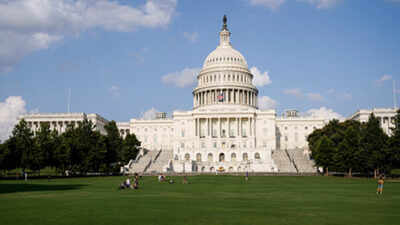Top Searches
- News
- World News
- US News
- After all-night hearing, Texas Republicans advance voting measure
After all-night hearing, Texas Republicans advance voting measure

Hundreds of Texans flocked to the Capitol over the weekend for the committee hearings on companion voting bills being pushed by Republicans. (Credits: Reuters)
AUSTIN: After an extraordinary all-night hearing, a Republican-backed bill to overhaul the state’s voting system cleared a key House committee in the Texas Legislature on Sunday morning, advancing the measure on an accelerated path toward a vote in the full 150-member chamber.
The vote by the House committee, which was conducted about 7:30 am after nearly 24 hours of debate and public comment, adheres to Gov. Greg Abbott’s timetable for swift action on the bill. A vote by the full House on the measure, which voting rights groups call one of the most restrictive in the nation, is expected this week. All nine Republicans on the committee supported the bill, while the five Democrats voted against it.
Abbott, a Republican, called the Legislature into a 30-day special session, which started Thursday, after Democrats blocked the bill in May with a dramatic 11th-hour walkout from the Capitol.
A state Senate committee, which also heard hours of testimony Saturday before a late-hour recess, is expected to vote on a version of the voter legislation when it returns to work as early as Sunday afternoon.
Hundreds of Texans flocked to the Capitol over the weekend for the committee hearings on companion voting bills being pushed by Republicans, part of a national effort by the party to impose new restrictions on state election systems. Republicans say the restructuring is necessary to improve voter integrity, but a host of Democrat-aligned opposition forces are fighting what they call an unprecedented campaign to suppress voting.
House and Senate Democrats have vowed to do everything necessary to kill the legislation a second time, but their options are limited. They have hinted that they are prepared to resort to another bold move, such as staging another walkout or possibly taking the more extreme step of fleeing the state.
Although retooled from the regular session, the voting bills in both houses resurrected most of the ingredients in the original legislation. Both would ban 24-hour voting and drive-thru voting sites, increase the criminal penalties for election workers who run afoul of regulations, limit what assistance could be provided to voters and expand the authority and autonomy of partisan poll watchers.
But the latest bills jettison two contentious provisions from the first round that Democrats had vehemently opposed, removing a limitation on Sunday voting and a provision that would have made it easier to overturn an election.
The vote by the House committee, which was conducted about 7:30 am after nearly 24 hours of debate and public comment, adheres to Gov. Greg Abbott’s timetable for swift action on the bill. A vote by the full House on the measure, which voting rights groups call one of the most restrictive in the nation, is expected this week. All nine Republicans on the committee supported the bill, while the five Democrats voted against it.
Abbott, a Republican, called the Legislature into a 30-day special session, which started Thursday, after Democrats blocked the bill in May with a dramatic 11th-hour walkout from the Capitol.
A state Senate committee, which also heard hours of testimony Saturday before a late-hour recess, is expected to vote on a version of the voter legislation when it returns to work as early as Sunday afternoon.
Hundreds of Texans flocked to the Capitol over the weekend for the committee hearings on companion voting bills being pushed by Republicans, part of a national effort by the party to impose new restrictions on state election systems. Republicans say the restructuring is necessary to improve voter integrity, but a host of Democrat-aligned opposition forces are fighting what they call an unprecedented campaign to suppress voting.
House and Senate Democrats have vowed to do everything necessary to kill the legislation a second time, but their options are limited. They have hinted that they are prepared to resort to another bold move, such as staging another walkout or possibly taking the more extreme step of fleeing the state.
Although retooled from the regular session, the voting bills in both houses resurrected most of the ingredients in the original legislation. Both would ban 24-hour voting and drive-thru voting sites, increase the criminal penalties for election workers who run afoul of regulations, limit what assistance could be provided to voters and expand the authority and autonomy of partisan poll watchers.
But the latest bills jettison two contentious provisions from the first round that Democrats had vehemently opposed, removing a limitation on Sunday voting and a provision that would have made it easier to overturn an election.
FacebookTwitterLinkedinEMail
Start a Conversation
end of article
